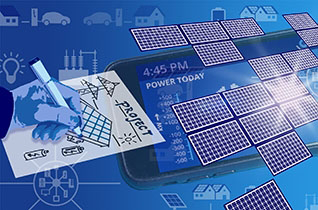MSc Sustainable Energy Technology
Degree: Master of Science Sustainable Energy Technology
Accreditation: Accredited by the NVAO
Credits: 120 ECTS, 24 Months
Type: Full-time
Start: September
Language: English
Current energy systems are primarily based on fossil fuels. These energy sources are not considered sustainable as there are limited supplies available and combustion of fossil fuels is the main cause of climate change. The energy transition aims to significantly reduce or even completely stop the use of fossil fuels by implementing a sustainable energy system. A transition to a society based on sustainable energy is necessary to be self-sufficient, meet the growing global demand for energy, and address the threat of climate change caused by greenhouse gas emissions. This transition from fossil to sustainable energy requires fundamental changes and innovations affecting the world’s energy landscape.
Securing a sustainable energy future implies an energy transition that will require a new generation of dedicated engineers and researchers capable of developing, optimising, and integrating sustainable energy sources including solar energy and heat, wind energy, geothermal energy, and energy from biomass. Because of the intermittency of some sustainable sources, storage of electricity and heat is an important factor for success. This requires innovative batteries, efficient heat storage, and research into hydrogen as an energy carrier. New technologies need to be integrated into new and existing electricity and heat networks, and into market structures. The design of new forms of energy distribution, energy market structures, and smart grids is necessary to satisfy the energy needs of modern societies.
The Master of Science programme Sustainable Energy Technology (MSc SET) covers the entire sustainable energy system: from generation by for instance solar PV or geothermal heat generation, to conversion, and from transport and storage of energy to consumption. The energy field is very diverse and for working with the technologies within a sustainable energy system you need expertise and background from different engineering disciplines. As energy use is also divided in different forms, the MSc SET programme has 2 different tracks: one track focussing on electrical energy, the most well-known and more and more used form of energy, and one track on heating and cooling.
System integrators of the energy transition
Engineers in Sustainable Energy Technology have a broad knowledge of the field and act as the system integrators of the energy transition. They bring together different energy subsystems into one system. Their engineering skills include renewable energy generation, distribution systems, and storage. In addition, they integrate systems that match the inherent uncertain fluctuating energy supply and varying demand. They are also aware of the challenges of the energy market and innovation management. There is a lot of demand for engineers with these skills, because governments and industry have ambitious plans for investments in sustainable energy.
Other students also viewed:




